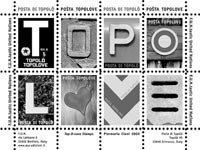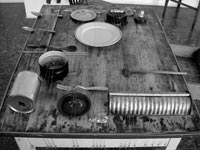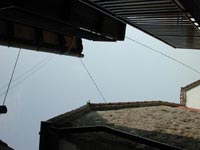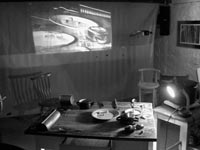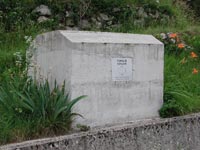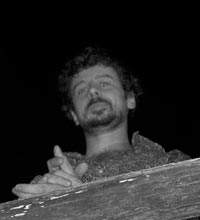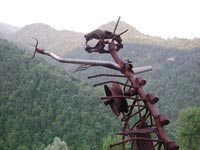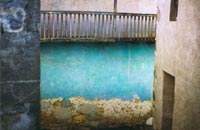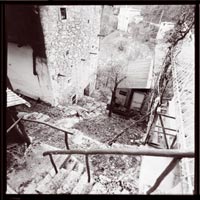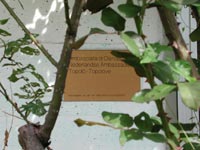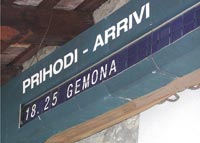Donatella Ruttar, Moreno Miorelli
Stazione di Topolo
The village Topolo/Topolove
(Italy) is at the end of the path and is surrounded by a forest and the
state boarder with Slovenia. It has no inn or shop, nor has it any basic
services, such as for instance a bus connection with the world. For the
past ten years this is where the entire world has been meeting, or at
least that part of the human race that is not conventional, is curious
and hard to define. This is the meeting point of vagabonds who love to
travel (or were forced to hit the road) and experience the life changes
that accompany their travels. Until a few years ago it was hard to meet:
boarders, restrictions, fear and nationalism changed even the use of language
into an ideology. In this case we are dealing with the 'Nadiše' dialect,
which has been spoken by the people in Topolove and the other Nadiše valleys
for centuries, while the hyper Italian patriots (Italianissimi) have been
demonising it.
The cold war created a social breakdown, a psychological blockade, fear
and suspicion were an everyday practice. The anti-communist organisation
Gladio, which was established by the Italian secret services covered the
entire territory with hundreds of members and led a game of decay. Two
thirds of the inhabitants moved away, people went to Belgian mines, the
'revolutionary' year of 1968 was shown only on television screens and
the income per inhabitant was the lowest in entire Italy.
Ten years ago an almost
Don Quixote like adventure started - Stazione di Topolo/Postaja Topolove
(Station Topolove) in this poverty stricken environment. The station is
a point where traffic and people meet and stop, exchanges take place and
the best part is that all this takes place in a spot that used to be completely
desolate. Topolove could not even be found on maps and even today the
paths - possible paths for subconscious atavistic danger - are not marked
on maps. This is all due to the boarder, even though it is a peaceful
boarder. The Nadiše valleys are a home to a language family that can be
traced all the way back to Vladivostok, i.e. the extreme border of the
'hic sunt leones' territory.
Aided by a small, yet brave association (Association of Venetian Artists
and the inhabitants of the Topolove village - today there are 39 inhabitants
of the village and all of them are members of the Topolo - Topolove Association)
Moreno Miorelli and Donatella Ruttar called on 16 artists, old friends,
and invited them to make a mark on the village with their works of art.
The only set precondition was that they have to be inspired by the surroundings,
by the village itself. Thus the village is the protagonist in all aspects
and not merely a background for artistic interventions. The chosen route
seemed to be the hardest, for we were not dealing with attractive murals,
but with contemporary art with a clear conceptual orientation. Only a
few believed in the project. Amongst them was also the mythical hairdresser
Luisa (who has been our sponsor for the entire ten years) and one bank
with a contribution of 500,000 Italian Liras. The installations were set
on display for 45 days. The word soon spread out and film directors made
their way to Topolove where they held sneak previews of their films, musicians
came to present their music experiments, narrators and the radio arrived,
especially the radio (what a coincidence) which is more prone to offer
attention to what needs attention. The approach was the same as today:
to be as informal as possible and use everything that is at hand. The
approach is also based on a total lack of haste or timetables (events
take place 'at sunset', 'at dusk', 'until dawn', only at the opening is
it allowed to have a real timetable 'roughly at 6 p.m.') and intermingling
anarchy with experimenting, which is never performed solely for the sake
of the experiment alone.
It immediately became clear that the pulling power of the trains in Topolove is love, a special feeling that bound and linked all artists, organisers, audience and reporters to gather in a place that 'does not exist'. A network was created that spread from the first participants in 1994 to all continents, the word spread restlessly and the Station was known in lecture rooms of universities and schools, where they tried to explain the unexplainable i.e. how to substitute the theories on art with the 'gut feeling', how to realise a project, which would demand great financial resources on a budget for a third rate garden party, only by placing trust in god's prudence, without any assurances, but on the basis of co-operation and trust, which emerge from informal human relations. Whoever participates at Station Topolove, does this at his/her own expenses. Even travel expenses are not reimbursed, and yet the artists come from New Zealand, Brazil, United States of America and other countries - or from the neighbouring village - just in order to participate in this project. They are put up as guests in homes, one of the best hosts being Antonella from number 95. This is where every arrival into the village receives a plate of food, a bed and is soon surrounded by a bunch of kids. Then the guests are settled into different houses.
It is also due to the recent history that hospitality has a double value here, the political taste in the highest and most noble meaning of the word, as was well observed by those who have terrified, threatened and talked behind other people's backs for years. All this was performed for the sole reason of stopping the utopia and reviving the dark years. As was noticed by the writer and journalist Paolo Rumiz, one of our fellow travellers, who involved in the 'topolovonauts' network the Station represents a great intervention against fear. At the same time the Station is putting up a fight against the myth of clean races, small homelands, cultures, that defend themselves by building obstacles, rejecting novelties and cultures that are seemingly different to them in the name of tradition, which often (luckily not always) hide dullness, lack of curiosity and mental laziness.
Already for a few years there is nothing on view in Topolove. This is how we try to escape the 'exhibition effect', i.e. a quick visit and a quick evaluation 'I like it, I don't like it'. Regardless of this the number of passengers to the last small village is on the increase. They are making their way to the small village so they could listen to a thousand ways of making sounds in the 21st Century, the sounds of the environment and tradition, choir and instrumental music. They wish to experience the magic of the opening of the unbelievable, yet possible airport run by the mysterious airline company Ingold Airlines. They also come here to send topolograms from the Post for Imaginary Countries, lead by Piermario Ciani, a man who knew a lot about Luther Blissett already at the time when nobody else even heard of him. The visitors can donate a book, a single book, to the Library of Favourite Books. They can listen to 20 hours long ecstatic pieces of music that Daniele Casali found amongst the documents of the forgotten Jewish community, which had three synagogues in Topolove, a Talmud school and so many musicians that they could fill the entire Central Europe. The participants of the Shiatsu school from Trieste offer free massages. (What is art and what is not is an issue that does not really matter in Topolove). They can attend the symphonic orchestra concert at the auditorium, which demands the closure of the only road that leads to Topolove. This took place on 19th July 2003, when the Youth Central European symphonic orchestra played here. The orchestra was established and lead by Igor Kuret, one of those people who dream with their feet firmly on the ground and have an ideal home in Topolove: a real, unreal, virtual home in a place inhabited by 39 people. They can listen to Marco Behrens, a German genius, to whom roofs sing in the rain or musicians from various music fields who play together only in Topolove. They spend the whole nights watching short Caucasian films or extra short films by young Slovene and Siberian artists, people from the East that has its own Western-most boarder in Topolove, or archaeologists or linguists, who are also talented film directors. But in the East, the far East of Italy first class artists do not merely stroll by, they constantly meet here, they are very discrete (possibly too much for show-business) and are approachable to everyone; this is where one can truly grow fond of them.
Everything in Topolove
is free of charge. The organisers say that this is due to their laziness,
for it 'is hard work tearing tickets'. Free of charge are also the workshops
for children, workshops for the rhythmical machinery of metal percussion
(Les tambours de Topolo) or those in which one can produce fabulous sound
objects, that the American Michael Delia teaches how to plan and produce.
Why does an event that has such a response not interest institutions?
The answer to this question is that the project and the executioners of
the project are very independent. Whoever wants to financially support
Station Topolove has to be content with the fact that he/she is entered
onto the list of sponsors, for there are no adverts or posters. It is
all about intelligent patronage, non-aggressive, patronage for somebody
who knows that sooner or later everything is repaid through the Karst
channels.
'At the end of one's life everybody takes with him only what he has given.'
This was the dedication in the accompanying brochure and this is how everybody
feels in the small village within the Grmek municipality in the Udine
area, only a few hundred yards away from the boarder that used to be the
iron curtain.
